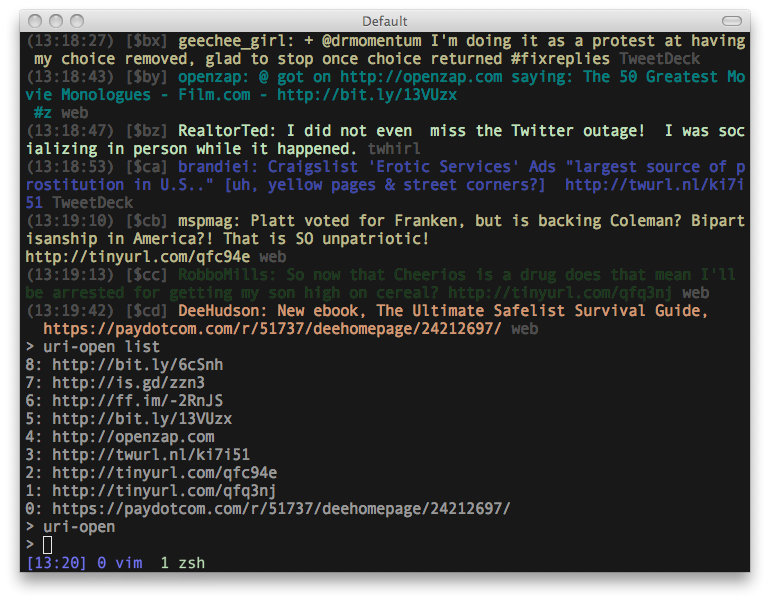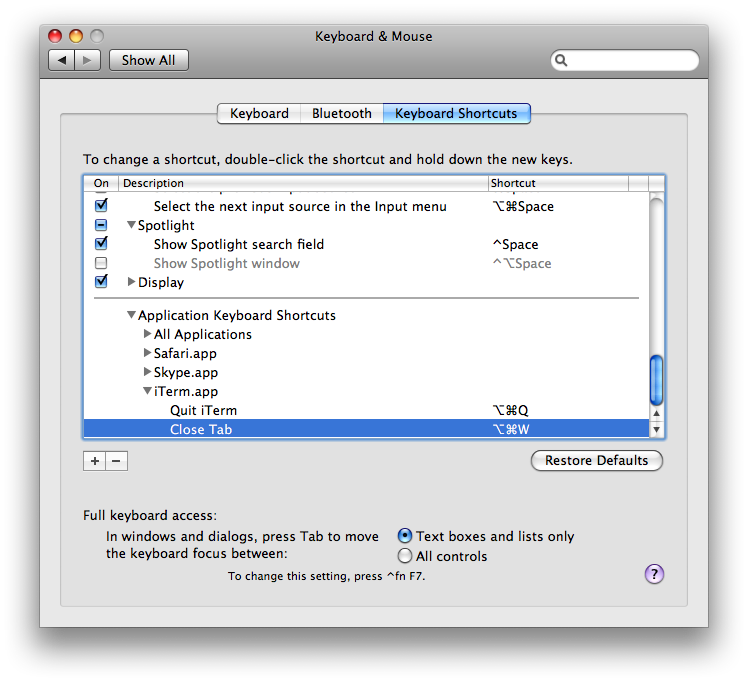
I committed some to Termtter. The following diff is the summary of my patches today.
diff --git a/lib/plugins/uri-open.rb b/lib/plugins/uri-open.rb
index 0afe73f..06a521b 100644
--- a/lib/plugins/uri-open.rb
+++ b/lib/plugins/uri-open.rb
@@ -8,44 +8,43 @@ module Termtter::Client
:points => [:output],
:exec_proc => lambda {|statuses, event|
statuses.each do |s|
- public_storage[:uris] += s[:text].scan(%r|https?://[^\s]+|)
+ public_storage[:uris] = s[:text].scan(%r|https?://[^\s]+|) + public_storage[:uris]
end
}
)
def self.open_uri(uri)
- unless config.plugins.uri_open.browser.empty?
- system config.plugins.uri_open.browser, uri
- else
- case RUBY_PLATFORM
- when /linux/
- system 'firefox', uri
- when /mswin(?!ce)|mingw|bccwin/
- system 'explorer', uri
+ cmd =
+ unless config.plugins.uri_open.browser.empty?
+ config.plugins.uri_open.browser
else
- system 'open', uri
+ case RUBY_PLATFORM
+ when /linux/; 'firefox'
+ when /mswin(?!ce)|mingw|bccwin/; 'explorer'
+ else; 'open'
+ end
end
- end
+ system cmd, uri
end
register_command(
:name => :'uri-open', :aliases => [:uo],
- :exec_proc => lambda{|arg|
+ :exec_proc => lambda {|arg|
case arg
- when /^\s+$/
- public_storage[:uris].each do |uri|
- open_uri(uri)
- end
- public_storage[:uris].clear
+ when ''
+ open_uri public_storage[:uris].shift
when /^\s*all\s*$/
- public_storage[:uris].each do |uri|
- open_uri(uri)
- end
- public_storage[:uris].clear
+ public_storage[:uris].
+ each {|uri| open_uri(uri) }.
+ clear
when /^\s*list\s*$/
- public_storage[:uris].each_with_index do |uri, index|
- puts "#{index}: #{uri}"
- end
+ public_storage[:uris].
+ enum_for(:each_with_index).
+ to_a.
+ reverse.
+ each do |uri, index|
+ puts "#{index}: #{uri}"
+ end
when /^\s*delete\s+(\d+)\s*$/
puts 'delete'
public_storage[:uris].delete_at($1.to_i)
@@ -53,19 +52,20 @@ module Termtter::Client
public_storage[:uris].clear
puts "clear uris"
when /^\s*(\d+)\s*$/
- open_uri(public_storage[:uris][$1.to_i])
- public_storage[:uris].delete_at($1.to_i)
+ open_uri(public_storage[:uris].delete_at($1.to_i))
+ else
+ puts "**parse error in uri-open**"
end
},
- :completion_proc => lambda{|cmd, arg|
- %w(all list delete clear).grep(/^#{Regexp.quote arg}/).map{|a| "#{cmd} #{a}"}
+ :completion_proc => lambda {|cmd, arg|
+ %w(all list delete clear).grep(/^#{Regexp.quote arg}/).map {|a| "#{cmd} #{a}" }
}
)
end
-# ~/.termtter
+# ~/.termtter/config
# plugin 'uri-open'
#
# see also: http://ujihisa.nowa.jp/entry/c3dd00c4e0
#
# KNOWN BUG
-# * In Debian, exit or C-c in the termtter kills your firefox.
+# * In Debian, exit or C-c in the termtter would kill your firefox.


